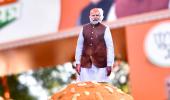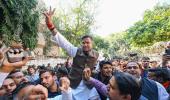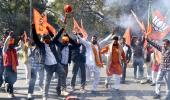The Delhi assembly results have underscored that a section of Arvind Kejriwal's committed supporters abandoned him because they were let down by his refusal to take a stand on crucial issues that impinge on the security and Constitutionally enshrined rights of the people, notes Nilanjan Mukhopadhyay.

The verdict of the election to the Delhi Vidhan Sabha underscores that India has not yet entered the post-ideology phase of politics and that besides identity, ideology, remains a crucial marker for the Indian electorate.
If the political philosophy of parties had indeed ceased playing a major part in determining electoral choices of people, Arvind Kejriwal and his party, the Aam Aadmi Party, would not have lost the polls so tellingly.
Paradoxically however, the party has not lost by a huge margin -- in absolute terms, the difference in the vote share of the AAP and the Bharatiya Janata Party is barely two percent.
It requires understanding that the large difference in the tally of seats is because the party suffered a significant swing away of 10 percent from the vote share it had won in 2020.
To understand this argument, let us examine the result from the Mustafabad constituency in northeast Delhi, which the winning candidate -- Mohan Singh Bisht of the Bharatiya Janata Party -- has threatened to get it renamed as either Shiv Puri or Shiv Vihar.
In this seat, Muslims are estimated to account for almost 40 percent of voters and it was one of the two constituencies where Asaduddin Owaisi's party, the All India Majlis-e-Ittehadul Muslimeen, fielded candidates for the first time.
Significantly, the AIMIM nominee, Mohammed Tahir Hussain, came in third in the Mustafabad electoral contest that Bisht won by a clear margin of 17,578 votes.
The runner-up, Adeel Ahmad Khan of the AAP, polled 67,637 votes while Hussain bagged 33,474 votes, taking their combined votes to more than 100,000, significantly higher than Bisht's total votes of 85,215.
Importantly, Mohammed Tahir Hussain, the AIMIM candidate, was previously an AAP municipal councillor but was suspended from the party when he was accused of rioting and conspiracy in the killing of an Intelligence Bureau staffer in the February 2020 Delhi riots.
Since then, he has been in judicial custody continually although in the run up the elections, he was granted day-long parole for a few days to campaign in the elections.
Hussain's suspension from AAP coincided with the party's refusal to take a stand on the anti-CAA agitation and the riots.
This had a twofold impact: Secular Hindus and almost every section of the Muslim community felt let down by the AAP and this was the reason for Hussain as the AIMIM candidate polling a sizeable of the vote, mainly from Muslims.
In 2020, the AAP candidate won with almost one lakh votes by a clear margin of almost 20,000 votes or almost 10 percent vote share.
There was no third candidate to split the anti-BJP vote like this time and the Congress candidate polled just a shade above five thousand votes.

The picture was different in 2015 and 2013. Till that time the Congress and its candidate, Hasan Ahmed, had not lost people support. But he was defeated in 2015 while he won in 2013.
AAP had significantly chosen a Hindu candidate in 2013 who polled barely 13.43% of votes while in 2015 they put up a Muslim candidate and he came in third but with 30.13% vote share, just 1.55% less than the Congress representative's share.
The vote share of AAP nominees in 2025 and 2020 (the party changed the candidate this time) dipped in this election by almost 10% and a significant share of this Muslim vote went to the AIMIM.
This was due to two reasons: Drift of votes away from the AAP because of its refusal to take an ideological position in 2019-2020 during the anti-CAA stir and the riots.
The party has also not spoken for the large number of youngsters who remain jailed since 2020 for alleged involvement in the riots and the presumed conspiracy to trigger these.
There is similar evidence across Delhi -- erosion in the support for AAP because it left one of its core supporter bases, to take care of themselves.
Actually, there is a pattern in Kejriwal's posture on the issue of religious polarisation and the carefully constructed assault on minorities, especially Muslims in the past decade.
It is true that at the time of AAP's formation in 2012 and during its campaign for the 2013 assembly elections, the divisive issue of communalism had not reared its head the way this happened subsequently.
In the elections in December 2013, the party broke fresh ground and stunningly won 28 seats and went on to form the government after the Congress extended unconditional support.
By then Narendra Modi had been nominated as the BJP's prime ministerial candidate, but Kejriwal had not chosen to target him for his role in the Gujarat 2002 post-Godhra carnage riots.
During his short 49-day stint as chief minister, Kejriwal steered cleared of divisive issues and focused completely on the party's anti-corruption plank and the welfarism package, all that the party and its chief leader, called as 'need-based politics'.
Although by that time the BJP under Modi's leadership was almost on the anvil of storming into power primarily on the basis of its divisive ideology camouflaged by the development spiel that Modi delivered, Kejriwal and his party colleagues had little interest to talk beyond corruption as the all-consuming poison on India.
It is not that graft was not an insidious issue in India, but to completely ignore the issue of hatred was indicative of a dangerous trait -- that of riding the ogre of communalism when and if it suited the party.
The contrast came out most tellingly in Varanasi where Kejriwal decided to challenge Modi and in this manner positioned himself as a contender for the national leadership position.
Modi's speeches in that 2014 campaign spoke about his achievements in Gujarat, promising replication of the Gujarat governance model in other parts of India, corruption scams in 10 years of UPA rule, gaining sympathy by drawing on his chai-wala days and OBC status, appealing to the nationalist inside every voter and projecting himself as strongest claimant to the top job.
The pro-Hindutva facets of his belief were veiled and dropped tacitly -- calling Rahul Gandhi disparagingly as Shehzade and the UPA regime as Delhi sultanate, both names with Muslim connotations.
Kejriwal too was not much different and began all his speeches with Bharat Mata Ki Jai to instill a sense of nationalism.
He remained fixated on his cliches -- that he is an aam aadmi just like the audience and that the aam aadmi is very powerful.
He went no further than corruption and drawing comparisons with jet-flying adversaries -- Modi and Rahul Gandhi, while he travelling in trains and buses.
He attacked business houses and cronyism, referring to Mukesh Ambani and Gautam Adani as being hand in glove with his opponents.
He also focused mainly on public participation in governance and a corruption-free society.

Despite the fact that Modi's decision to contest from Varanasi was prompted by the objective of infusing religiosity and introducing Hindu imagery in politics, Kejriwal made no effort to counter this.
He showed disinterest in how people were divided on the basis of religious identity.
In the course of the decade since 2014, Indian society has got communally polarised mainly because of several policies and initiatives of the Union government and the BJP, but at no point did Kejriwal combat these moves on his own or lend support to those who were.
He refused to adopt an ideological posture and thought that his posture as a post-ideology politician would be endorsed by the people.
The Delhi assembly results have underscored that a section of his committed supporters abandoned him because they were let down by his refusal to take a stand on crucial issues that impinge on the security and Constitutionally enshrined rights of the people.
Nilanjan Mukhopadhyay is an author and journalist based in Delhi-NCR.
His latest book is The Demolition, The Verdict and The Temple: The Definitive Book on the Ram Mandir Project.
He is also the author of Narendra Modi: The Man, The Times.
Feature Presentation: Aslam Hunani/Rediff.com











 © 2025
© 2025